| |
Oliver Klaus
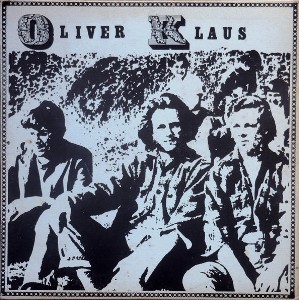
Oliver Klaus
Capt. Moze - 1970
Michael Panontin
|
The history books list Waterloo, a tiny town (pop. 4,410) in Quebec's Eastern Townships, as having once been a hotbed of anglo notables, like railway baron and parliamentarian E. B. Forster, and John R. Booth, once known as the Lumber King of Canada. But to historians of a more musical bent, it is the home of the Singfield brothers, founding members of Oliver Klaus, whose privately pressed psych-rock LP is thought to be the first such record in this country.
The pair, guitarist Maurice and drummer Bryan, had been in bands since their early teens, including a stint in a francophone group called Les Notables (whose later groovy nugget 'Aileurs et Ici' is most definitely worth your attention). "When I was 15 I became interested in the guitar and my parents bought me one," Maurice would tell It's Psychedelic Baby. "Gradually I became acquainted with the instrument and started learning chords and some pop tunes, mainly Beatles tunes. They were all the rage at the time and my mother fed us (me and my brother Bryan) Beatles records and magazine articles, which encouraged us to form a band."
With Graham Worden rounding things out on bass, the trio dubbed themselves Oliver Klaus (after Maurice's middle name) and landed their first gig at a high school in nearby Granby in 1967. From there it was on to community centres, arenas, bars and even a slot at Man and His World for Expo '67.
By 1969, with Worden having been replaced by their high school chum Jerry Cushen, the boys dove head first into the burgeoning world of improvisational rock. "Our shows were always very spontaneous [with] long jams that would go on for fifteen to twenty minutes and interesting arrangements of popular songs." But like many of the bands on the Montreal scene at the time, Oliver Klaus also had a softer side. Longer free-wheeling guitar and drum solos often mingled with more melodic elements, sometimes even in the same song. 'Feeling Groovy', which was also released as a single on the Trans-World label, is a case in point, with its sunny west-coast themes punctuated by the sort of heavily distorted solos that were coming out of Michigan that year.
Oliver Klaus were nothing if not ambitious. With enough songs to fill one side of an LP and with no prospects of a record label signing them, they decided to take things into their own hands. "We built our own recording studio in Waterloo in the basement of a restaurant where we practised. We scrounged second-hand construction materials and purchased used mics, a tape deck and a console from a local radio station." The same sort of DIY tactics were used for the live tracks on side B, with four microphones scattered around the Waterloo Arena, two Sony C38s in front to capture the instruments and a pair of Shure mics set up for the vocals.
The three took their tapes over to RCA Studio in Montreal and had 500 copies of Oliver Klaus pressed up. Side A, which was unfortunately recorded out of phase and had to be transferred to mono, showcases their rural experience. 'Sunny Day', for example, trods much the same paths as its stylistic sibling, 'Feeling Groovy', while a track like 'Walk in the Night', with its bucolic freak-folk elements, wouldn't sound out of place around a pot-fuelled, late-night campfire. Side B rocks much harder and is by Singfield's own admission "a complete reflection of the concert scene at the time". Neil Diamond's 'Kentucky Woman' and Donovan's 'Season of the Witch' are stretched out to eight minutes each and sound very au courant with those high-flying guitar pyrotechnics and belted-out blues vocals.
While Oliver Klaus was unsurprisingly dead on arrival, the guys never really stopped playing. They released a second independently produced LP, Homeless, in 1996 ("We still had the same Sony mics that we used on the first album"). And the Singfield brothers still live in Waterloo, where they continue to play and perform. Oliver Klaus has been reissued over the years on vinyl and on CD. But if it's one of the few surviving original copies that you're hankering for, a decent one could set you back as much as a thousand dollars (USD).
|
|
Suggestions
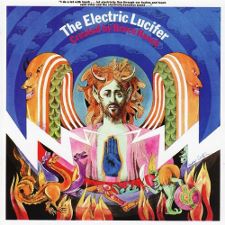
Bruce Haack
The Electric Lucifer
Columbia
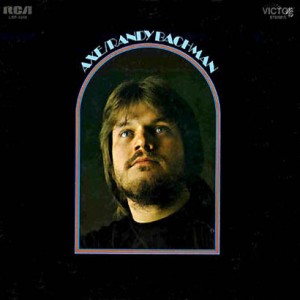
Randy Bachman
Axe
RCA
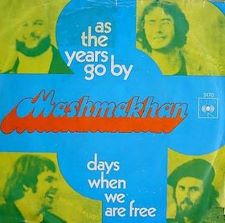
Mashmakhan
As the Years Go By / Days When We Are Free - 7"
Columbia
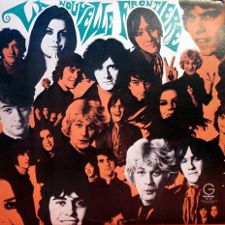
La Nouvelle Frontiere
La Nouvelle Frontiere
Gamma
|








